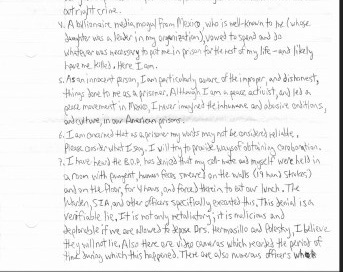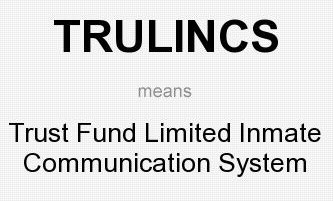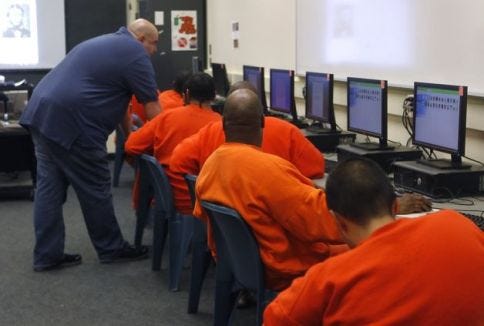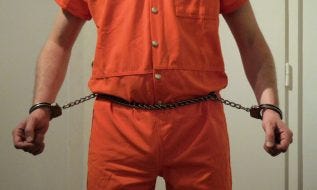Are Keith Raniere’s Claims that BOP Blocks Access and Spies On His Attorney-Client Communications True?
Read Luthmann's Latest From the Frank Report
This article was first published in the Frank Report (www.frankreport.com) on March 10, 2023. Read it here:
Are Raniere’s Claims that BOP Blocks Access and Spies On His Attorney-Client Communications True?
The Sixth Amendment guarantees the right to counsel.
SCOTUS underscored the importance of this many times, perhaps most famously in Strickland v. Washington.
Access to counsel’s skill and knowledge is necessary to grant a defendant or prisoner the opportunity to petition the courts and secure all legal rights to which they are entitled.
Due process and opportunity to be heard begin and end with the right to access counsel.
According to Keith Raniere, access to counsel is one of the choke points the Bureau of Prisons (BOP) and Department of Justice (DOJ) have used to frustrate his ability to prove his “actual innocence.”
Raniere’s right to counsel is constitutionally protected. But what about his access to counsel while in BOP custody?
Does Raniere actually have regular, confidential communications with his lawyers while a resident of the USP-Tucson SHU?
In his recently-released missive, the Vanguard had this to say:
I am innocent of these charges: I believe the legal term is “actually innocent.” Please see this link to a press conference by Alan Dershowitz and other bipartisan credible sources:
As noted in the press conference, these charges were brought against me using an unprecedented, historical, level of government malfeasance and outright crime.
****
I am concerned that as a prisoner, my words may not be considered reliable. Please consider what I say. I will try to provide ways of obtaining corroboration.
*****
Shipping me from USP Tucson, away from my attorneys, in a physically painful, potentially torturous process, into another potentially more dangerous environment foreign to me, is what is traditionally done by B.O.P. to silence and/or punish inmates. Please do not let me be silenced or shipped.
*****
When one is held in the S.H.U., as I am now, it is supposed to be substantially similar to being in general population (GP).
Certainly, this would mean my attorney visits, and even personal visitation, would be virtually identical to being in GP. This is absolutely not the case. Simple questioning of B.O.P. officials, and my attorneys, along with B.O.P. video footage, will establish what I say.
*****
My unit team informed me my transfer is because of too much legal activities: calls and visits. I average less than 1 visit (2-3 hours) and 1 call (1 to 2 hours) per week.
Raniere claims he is “actually innocent,” but because he’s a prisoner, no one believes what he says. The inability to confer confidentially with counsel would hinder Raniere from relaying crucial information that may secure his release or a new trial.
Monitored communications and institutional safety protocols are preventing Raniere from receiving legal representation’s full benefits, and this, he claims, is part of his persecution at the hands of the DOJ and BOP.
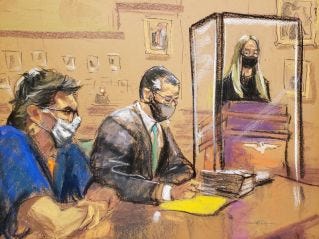
We will analyze whether Keith Raniere has meaningful access to his lawyers while in BOP custody to prove his “actual innocence.”
Email Communications
The first email was sent in 1971, making the technology roughly fifty years old. Most BOP prisoners can send emails on a limited, monitored system called TRULINCS. This system allows electronic correspondence between inmates and BOP-approved contacts.
To participate in TRULINCS, the prisoner waives attorney-client privilege and consents to monitoring of all messages, including those to and from their attorneys.
The absence of privileged email exchanges deters clients from sharing sensitive but crucial information with their attorneys, preventing them from receiving the full benefits of legal representation.
Keith Raniere cannot have confidential email communications with counsel through the BOP TRULINCS system for several reasons.
First, Raniere is a sex offender. As such, he cannot use the TRULINCS email system because of the Adam Walsh Child Protection and Safety Act of 2006.
The Adam Walsh Act prevents sex offenders from accessing such electronic communications because they may improperly contact minors or other vulnerable persons.
There is no cure for pedophilia, and the CHOMOs (prison slang for child molesters) should be as far away as possible from emails.
I saw these degenerates firsthand while I was away.
Second, assuming Raniere had TRULINCS privileges, he usually would not have access to the system while in the SHU.
The SHU ranges are not equipped with computers.
Assuming Raniere had access to a TRULINCS station, all prisoner communications are monitored. Raniere can be assured that the FBI, Assistant US Attorneys, and BOP staff will view anything he writes to his lawyers.
The DOJ has not invested in a workaround to sort out attorney-client communications from all others, even in a post-Covid world where face-to-face visits are often eliminated.
The BOP rolled out TRULINCS in 2006. The system has not been updated with the times. Fifteen years ago, the technology to filter out privileged emails from the rest of prisoners’ emails may have been cost-prohibitive. Feasible technical solutions can now be implemented in months, costing less than half a million dollars. But the courts have been reluctant to compel the DOJ and BOP to modernize to protect the Constitution.
After all, there is nothing in the US Constitution about the Internet.
While our political branches regularly send billions to defend foreign nations overseas, the government can’t spend half a million to permit prisoners, many of whom are pretrial and “innocent” until proven guilty, to communicate with their defense attorneys.
The Orwellian-named Department of Justice is quick to do the hard part – speak about its commitment to due process, but when it comes to the easy part – a little practical application of due process principles – it leaves that to the unseen future.
While every DOJ press release is sure to state how a defendant is presumed innocent until proven guilty, the DOJ cannot make the slightest effort to permit these “innocents” to email attorneys to help provide a proper defense.
The US Attorney’s Office is not shy about their spying. They tell you they are doing it.
The House of Representatives tried to fix the inmate-attorney communications issue in 2021. The bipartisan Effective Assistance of Counsel in the Digital Era Act passed by an overwhelming vote of 414-11 in the House. It was an act that merely supported due process, as it would enable incarcerated individuals to communicate privately, safely, and efficiently with their lawyers.
The act prohibited the Bureau of Prisons from monitoring privileged electronic messages. But due process is not the goal. Talking about due process is the goal.
The bill stalled in the Senate and is all but dead in the Judiciary Committee.
But the point is moot for Raniere, as TRULINCS communications with his lawyers or anyone else is out.
Telephone Calls
In 1876, Alexander Graham Bell became the first to obtain a U.S. Patent for an “apparatus for transmitting vocal or other sounds telegraphically.” Telephone calls began. Prisoners are entitled to use this 150-year-old technology to contact their lawyers, subject to a host of restrictions.
First and foremost, standard BOP phone calls are monitored and recorded. To speak to your lawyer on a non-monitored, non-recorded line, you must get your attorney to request a special prison legal call.
One of BOP Correctional Counselors’ regular duties is as a gatekeeper for prisoner legal calls. Only an attorney may request a legal call.
After that, a Correctional Counselor investigates the attorney. Once clearance occurs (which could take minutes, hours, days, or weeks), the prisoner’s legal call is prioritized or delayed by various factors (many subjective, pretextual, or illusory), including institutional safety and security, staffing, facility availability, demand among the inmate population, current conditions within the institution (e.g., COVID-19 measures, security threats, lockdown, etc.) how much the Correctional Officers likes a prisoner or, in a special instance, when a prisoner might be innocent and has a chance at proving it. The latter often ensures delays and difficulties in regular communications.
This making it difficult for prisoners to speak on the phone to attorneys is another tip of the hat to Orwell, who taught us all that a government institution that names itself after the opposite of what it is really all about will fool most people.
Truth in advertising would require the Department of Justice to change its name to the Department of Prosecution.
But it gets better.
When a legal call is finally scheduled, the prisoner reports to the Correctional Counselor’s office at an appointed time. If, for whatever reason, there is a problem and either the prisoner or the Correctional Counselor is not there at the appointed time, the call is rescheduled (days or weeks) later.
Correctional Counselors often are absent when a critical legal call is scheduled. This is great for discouraging lawyers trying to represent prisoners.
Prisoner legal calls take place in a staff office. If the call goes off, the counselor facilitates the call. The staff member leaves the office and “visually monitors” (glares at, intimidates, shows annoyance, impatience, or may distract) the inmate from outside the room.
Once outside the room, the BOP claims the Correctional Counselor cannot hear the content of the telephone call with the inmate and the lawyer.
But the BOP and DOJ never represented that there are no listening or recording devices in Correctional Counselors’ offices.
The lack of candor about surveillance of lawyer-client privileged calls is perhaps justified to maintain “institutional safety and security.”
“The Thing,” also known as the Great Seal bug, was one of the first covert listening devices (or “bugs”) to use passive techniques to transmit an audio signal. It was concealed inside a gift given by the Soviet Union to W. Averell Harriman, the United States Ambassador to the Soviet Union, on August 4, 1945.
In the past seventy-five years, the US Government has perfected listening devices. Today, they may even be shaped like a fly on the wall. Are the BOP and the DOJ involved in spycraft on inmates?
The bulk of how Keith Raniere speaks with his lawyers is through prison legal calls. And these calls, he says, are part of why he may be getting shipped to a Communications Management Unit (CMU).
Face-to-Face Lawyer Meetings
At the time of the Constitutional Ratification in 1788, lawyers met with clients face-to-face.
Prisoners are given the right to meet face-to-face with counsel the way the constitutional framers intended it 235 years ago but subject to the same “slight” gatekeeping restrictions as telephone calls.
The BOP and DOJ have never stated whether “bugs” – a technology commonly used by the DOJ and the FBI – are present in the attorney-client meeting rooms in their institutions.
Raniere complains he must endure pain and torture to see his lawyers in person. He must have his hands and ankles shackled for hours on end. The result is bruises, swelling, cuts, and bloodied ankles for weeks.
The lawyers also have to endure significant inconveniences. They are subject to long waits and enhanced security screenings when they arrive at BOP facilities. A single-hour meeting with a client may require four or five hours of attorney time. It is a wholly inefficient use of time, maybe intentionally so.
What contact with counsel Raniere has garnered is curtailed by his placement in the USP-Tucson SHU and will be further curtailed if he is placed in a CMU.
Face-to-face meetings are available to Raniere, but they are physically demanding.
The Verdict
Prison email and messaging services, as well as the recording of phone calls, threaten the attorney-client privilege in the US. Even though the right to have confidential conversations with an attorney is supposed to be a core principle of American justice, the right is probably illusory in federal prisons.
Raniere is effectively denied the right to counsel while incarcerated in the SHU. But Raniere is not alone. The DOJ and the BOP have derogated the attorney-client relationship, which is becoming less sacrosanct as Government encroachments have become more invasive and widespread.
Raniere’s access to counsel strikes as below minimum Constitutional standards. He can meet with lawyers, but the experience is, in his words, a “physically painful, potentially torturous process.” Attorneys cannot be expected to zealously represent a client when both the lawyer and the inmate-client have to go “through the ringer” before the first word is said.
More importantly, are the right words being said? Federal prosecutors in Brooklyn, where Keith Raniere was prosecuted, regularly search for incriminating evidence by reading emails between defendants and their attorneys.
A Federal Court upheld the practice.
The court observed that inmates are provided with sufficient alternative means to engage in privileged communications with lawyers by phone calls, mail, and in-person visits. But a shackled, cuffed, cut, and bloodied experience just to see a lawyer is not “sufficient” in Raniere’s case, when it smacks as part of a pattern of retaliation and torture.
The court’s decision and others like it fail to appreciate that, especially post-Covid, email communication is the most efficient and viable form of communication used by lawyers in the twenty-first century. This is especially true for inmates like Raniere seeking access to lawyers for post-conviction matters.
The BOP and DOJ’s encroachment on attorney-client communications hamstrings crucial communication and makes effective representation a pipe dream.
But more than access to counsel, the issue is fundamental fairness. Raniere’s Prosecutrix, Moira Kim Penza, probably knew everything Raniere’s lawyers were thinking and saying. After all, Raniere was captured in Mexico and delivered directly to federal custody. He has been in BOP facilities ever since. He didn’t meet his criminal defense attorneys until after his arrest. Everything Keith Raniere told his lawyers was known to the prosecutors.
Did Moira “tailor” her case strategy and trial presentation accordingly? Of course.
Isn’t this cheating? It might have been done for “the right reasons.” But that’s not what we tell our children. We tell them, “cheaters never win, and winners never cheat.”
We tell our children that the American government is committed to due process, like attorney-client confidentiality, innocent until proven guilty, and the right to a fair trial.
While due process can help the guilty, it also protects the innocent. Since due process is supposed to prevent the Government from deciding in advance who is guilty [i.e., everyone they choose to prosecute], due process makes the prosecution’s job more difficult since innocent defendants are supposed to have a shot at acquittal.
Something the Orwellian-named Department of Justice would abhor.
When the New England Patriots got caught stealing messages and signals from opposing coaches in Spygate, everyone judged it was wrong because it belittled the integrity of the game.
The NFL fined the team and the coach, Bill Belichick. It is fundamentally unfair if one team knows what play the other team is going to call before the snap.
But when the Goverment cheats, the people Orwell envisioned – with the jackboot of government eventually on their necks forever -are too absorbed with hating the prisoner that they cannot work up the intellectual acumen to distinguish between the defendant Raniere and the next defendant who may be innocent.
It is not up to the Department of Prosecution to decide who is innocent, but with their neat Orwellian name, the Department of Justice, there are some who, whatever they do, is to live up to their name, and their shit streaks don’t stink.
The DOJ and BOP’s current practices undermine the due process of law, and if the sheeple ever grew a brain, it should erode confidence in convictions.
In the same way, the Patriot teams of the 2000s will always be looked at askance compared to the great NFL teams of all time who won honestly. So too, do numerous convictions, including Raniere’s, remain open to question, and will for years to come.
If Raniere is such a nasty dude, why did the Government have to cheat to put him away?
Americans do not tolerate cheaters except when the cheaters are Federal Prosecutors.
We question the ethics of mayors and senators, even presidents. We scrutinize business leaders and charities because we know people are self-interested and that power corrupts.
We even question the police.
But somehow, Americans never think that one of the most powerful positions of all, with the right to take someone’s freedom away, should ever be questioned.
The apathy and ignorance will have to stop, so our Orwellian named Criminal Justice System retains some semblance of moral legitimacy and fundamental fairness. Or, out of truth in advertising, it could be called our Criminalizing Injustice System.
Richard Luthmann is a writer, commentator, satirist, and investigative journalist with degrees from Columbia University and the University of Miami. Once a fixture in New York City and State politics, Luthmann is a recovering attorney who lives in Southwest Florida and a proud member of the National Writers Union.
For Article Ideas, Tips, or Help: richard.luthmann@protonmail.com or call 239-287-6352.
The news media is a critical check on the powerful, serving as a watchdog to hold elected officials and other public figures accountable for their actions. The media was first called the fourth estate in 1821 by Edmund Burke, who wanted to point out the power of the press. The press plays a crucial role in providing citizens with access to information about what is happening in government, as well as shining a light on corruption, abuse of power, and other forms of wrongdoing.


